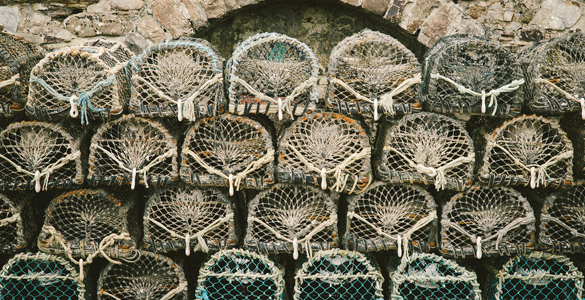The Senedd’s Committees have been considering the UK Fisheries Bill 2019-21.
These answers to frequently asked questions explain what the Bill means for Wales.
We’ve published separate detailed briefings on:
- the Senedd’s consideration of the Welsh Government’s Legislative Consent Memorandum (LCM) on the Bill, (PDF, 642KB) and
- the relationship between the EU Common Fisheries Policy (CFP) and post-Brexit fisheries management in Wales (PDF, 2.6MB)
What does the UK Fisheries Bill do?
The UK Government introduced the Bill into the House of Lords on 29 January 2020. The House of Lords Library has published a briefing for the Lords stages.
The Bill aims to provide a legal ‘Fisheries Framework’; ensuring some commonality of approach to fisheries management across the UK after it has left the CFP. It is also designed to address the UK’s commitments under the United Nations Convention on the Law of the Sea (UNCLOS) (with regards to fishing activities in UK waters).
At the Welsh Government’s request, the Bill also includes additional powers for the Welsh Ministers (for example on selling quota). These are outlined in the Welsh Government’s Legislative Consent Memorandum (LCM).
How has the Senedd considered the Bill so far?
The Welsh Government laid its LCM for the Bill before the then Assembly on 12 February 2020.
The Climate Change, Environment and Rural Affairs (CCERA) Committee and the Legislation, Justice and Constitution (LJC) Committee took evidence on the LCM and have published their reports:
What happened to the previous UK Fisheries Bill?
The 2019-21 Bill is similar to the UK Fisheries Bill 2017-19. The 2017-19 Bill had its second reading in the House of Commons and ten sittings in a public bill committee in late 2018. We published a summary of the 2017-19 Bill in January 2019.
The Welsh Government laid the LCM for the 2017-19 Bill (PDF, 106KB) before the Assembly in November 2018, followed by a Supplementary LCM in January 2019.
The CCERA Committee and the then Constitutional and Legislative Affairs (CLA) Committee (now LJC Committee) both published reports on the LCMs in February 2019:
- CCERA Committee report on the LCMs (PDF, 788KB); and
- CLA Committee report on the LCMs (PDF, 557KB).
The 2017-19 Bill fell when the UK Parliament was prorogued ahead of the December 2019 General Election.
How is the current Bill different from the previous Bill?
While the 2019-21 Bill is similar to the 2017-19 Bill, some key changes which relate to the Senedd’s competence include (but are not limited to):
- changes to the fisheries objectives;
- changes to the joint fisheries statement provisions;
- an additional power for the Welsh Ministers to make regulations enabling the sale of rights to Welsh ‘catch quotas’ or ‘effort quotas’;
- broadening of financial assistance powers; and
- an additional power for the Welsh Ministers to impose charges for carrying out functions relating to the regulation of marine activities.
What’s the Welsh Government’s position on the Bill?
The Welsh Government’s LCM states:
It is the view of the Welsh Government it is appropriate to deal with these provisions in this UK Bill as there needs to be a UK wide approach to create the Fisheries Framework ... The Bill also contains a number of provisions which must be in place before the end of the [Brexit] implementation period. For non-framework powers, it is important the Welsh Ministers are able to act quickly and decisively in Wales, until we can bring forward a comprehensive Wales Fisheries Bill.
In contrast, the Welsh Government’s LCM for the 2017-19 Bill emphasised that it was not content with clause 18 (now clause 23) of the Bill as it provided broad powers for the Secretary of State to set UK quotas.
While the drafting of the clause is the same in both Bills, the Minister for Environment, Energy and Rural Affairs, Lesley Griffiths, told the LJC Committee on 16 March 2020 that she had received reassurances from the UK Government that this matter would be addressed via a Memorandum of Understanding (MoU) before the end of the Brexit transition period.
What new powers does the Bill give to the Senedd and to Welsh Ministers?
The new regulation making powers for the Welsh Ministers are explored in more detail in the 2019-21 Bill LCM briefing.
The Bill amends the Government of Wales Act 2006 to extend the legislative competence of the Senedd so it can make primary legislation in relation to fisheries in the area of the Welsh sea beyond 12 nautical miles.
Specifically, this means primary legislation on matters relating to fishing, fisheries or fish health in the area of the Welsh zone beyond the seaward limit of the territorial sea (beyond 12 nautical miles from the shore).
Section 158 of the 2006 Act defines the ‘Welsh Zone’ as being the sea adjacent to Wales which is within British Fishery Limits or otherwise specified in an order made under that Act.
What have Senedd Committees said about the Bill?
The CCERA Committee recommended that the Senedd give legislative consent to the Bill, subject to certain conditions. The LJC Committee made ten recommendations to the Welsh Government. Please see the reports for details.
Will there be a Welsh Fisheries Bill?
On 1 May 2020, in a letter (PDF, 775KB) to the Chair of the CCERA Committee, the Minister said:
It remains my intention to take powers for Welsh Ministers in the UK Fisheries Bill as an interim measure until a comprehensive Welsh Fisheries Bill, covering both Wales and the Welsh zone can be brought forward. Due to dependencies of the timing of the UK Bill and next stages of our Future Fisheries Policy, I cannot be certain on timings and it is certainly not possible to bring a Bill forward before the end of this Assembly, given the delays to the Bill last year and now the COVID-19 pandemic.
The CCERA Committee has made recommendations in relation to a Welsh Bill in its LCM report.
Does the Bill stop foreign vessels fishing in Welsh waters?
The Bill’s Explanatory Memorandum (EM) explains that access for EU and other foreign vessels to UK waters will be a matter for negotiation.
The Political Declaration (PDF, 408 KB), agreed by the UK and the EU, sets a deadline for a fisheries agreement of July 2020. However, the Bill allows for the EU legislation which currently provides automatic rights for EU-registered vessels to access UK waters to be revoked. The EM states that the Bill also:
…introduces a new requirement that foreign fishing in UK waters must be licensed by the MMO [Marine Management Organisation]or one of the Fisheries Administrations to fish in UK waters or be for a purpose recognised under international law (for example, freedom of navigation).
However, the Bill doesn’t distinguish between UK-registered vessels that have UK owners and those with owners based outside the UK. So any vessels registered in the UK will be treated as UK vessels irrespective of where their owners are based.
What does the Bill mean for access for Welsh vessels to other UK waters?
The Bill provides for equal access for UK vessels in UK waters by clarifying that licences issued by one of the licensing authorities are effective throughout UK waters. However, powers are also included for the different UK administrations to apply conditions on licenses for vessels fishing in their waters.
Will the CFP still apply?
The UK will leave the CFP at the end of the Brexit transition period, in December 2020.
However, certain regulations relating to the CFP will become retained UK law by virtue of the EU (Withdrawal) Act 2018. These regulations have already been amended somewhat and the Bill, if passed, will also revoke certain Articles of the regulations (including Article 5 on the right of equal access for EU fishing vessels to waters of Member States).
Does the Bill determine fishing quota for Wales?
No. While some provisions in the Bill relate to quota (for example, to the sale of quota), the Bill doesn’t determine fishing quota or change the process for allocating quota between the UK and the EU or within the UK. However it does introduce a new role for the Secretary of State (discussed below).
The approach to distributing quota for shared stocks with the EU will be determined during negotiations. The UK Government has produced a document that sets out its approach to the UK’s future relationship with the EU, including fisheries. The concordat on quota distribution between the four UK administrations remains in place.
It’s worth noting that clause 23 allows the Secretary of State to determine fishing opportunities for a calendar year for the UK. This may be done only for the purpose of complying with an international obligation of the UK. This power has been controversial (see section on the Welsh Government’s position above).
Does the Bill set out how seafood will be traded between the UK and the EU?
No. This will be a matter for negotiation between the UK and EU. A House of Commons Library briefing describes fisheries as very important to the trade negotiations:
The UK Government has set out that it envisages a “suite of agreements” including a comprehensive free trade agreement and an agreement on fisheries. The EU position is that agreement on fisheries shall guide the conditions on agreement of a future economic partnership[PDF, 320 KB], specifically “access conditions under the free trade area”.
On 6 May the National Assembly for Wales became the Welsh Parliament, to be commonly known as Senedd. As a result, references in this article reflect the change of name, referring to the institution as the ‘Assembly’ in a historical context (prior to 6 May) and ‘Senedd’ thereafter.
Article by Emily Williams, Senedd Research, Welsh Parliament






